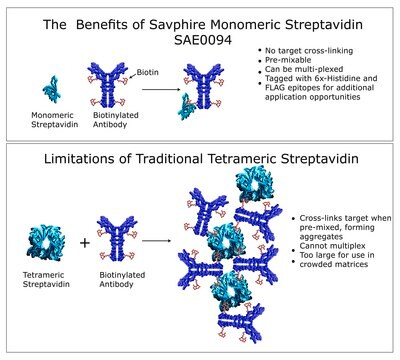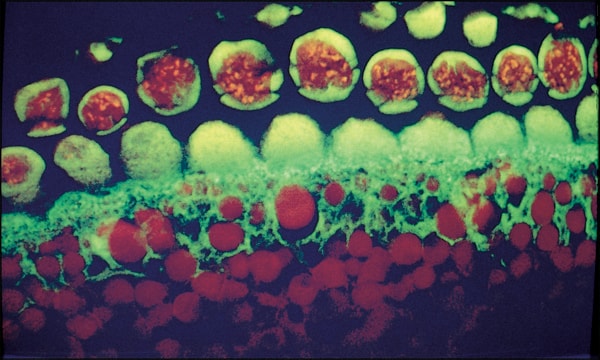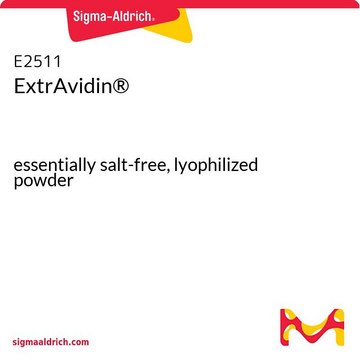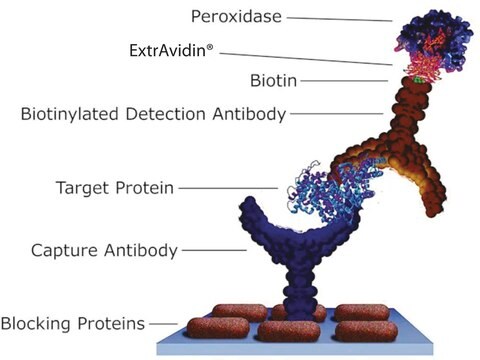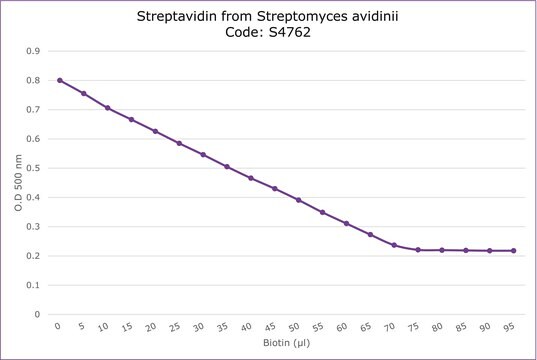Wszystkie zdjęcia(1)
Key Documents
E4142
ExtrAvidin®−Cy3™
buffered aqueous solution
Zaloguj sięWyświetlanie cen organizacyjnych i kontraktowych
About This Item
Polecane produkty
białko sprzężone
CY3 conjugate
Poziom jakości
Postać
buffered aqueous solution
zakres etykietowania
3-9 mol Cy3 per mol protein
metody
immunohistochemistry (formalin-fixed, paraffin-embedded sections): 1:100
Warunki transportu
wet ice
temp. przechowywania
2-8°C
Zastosowanie
ExtrAvidin®-Cy3™ is suitable for the following applications:
- Immunohistochemistry (formalin-fixed, paraffin-embedded sections) at a dilution of 1:100
- Immunocytochemistry.
- Used for labeling.
Działania biochem./fizjol.
Avidin is a tetrameric or dimeric biotin-binding protein produced in the oviducts of birds, reptiles and amphibians and deposited in the whites of their eggs. It consists of four high affinity binding sites for biotin. ExtrAvidin® is prepared from egg white avidin. It is a modified form of affinity purified avidin and binds biotin with high specific activity of avidin with the low background staining of streptavidin, a biotin binding protein produced by the bacteria Streptomyces avidinii. ExtrAvidin® is covalently conjugated to Cy3 dye and is used for various techniques.
Postać fizyczna
Solution in 0.01 M phosphate buffered saline, containing 1% bovine serum albumin and 15 mM sodium azide
Uwaga dotycząca przygotowania
Affinity purified protein
Informacje prawne
Cy3 is a trademark of Cytiva
ExtrAvidin is a registered trademark of Merck KGaA, Darmstadt, Germany
Oświadczenie o zrzeczeniu się odpowiedzialności
Unless otherwise stated in our catalog or other company documentation accompanying the product(s), our products are intended for research use only and are not to be used for any other purpose, which includes but is not limited to, unauthorized commercial uses, in vitro diagnostic uses, ex vivo or in vivo therapeutic uses or any type of consumption or application to humans or animals.
This page may contain text that has been machine translated.
Kod klasy składowania
12 - Non Combustible Liquids
Klasa zagrożenia wodnego (WGK)
WGK 3
Temperatura zapłonu (°F)
Not applicable
Temperatura zapłonu (°C)
Not applicable
Certyfikaty analizy (CoA)
Poszukaj Certyfikaty analizy (CoA), wpisując numer partii/serii produktów. Numery serii i partii można znaleźć na etykiecie produktu po słowach „seria” lub „partia”.
Masz już ten produkt?
Dokumenty związane z niedawno zakupionymi produktami zostały zamieszczone w Bibliotece dokumentów.
Rita B Santos et al.
Biotechnology journal, 13(7), e1800050-e1800050 (2018-03-13)
Medicago truncatula is an established model for studying legume biology. More recently, it has also been exploited as a Molecular Farming platform for the production of recombinant proteins, with the successful expression of fungal and human proteins in plants and
Brian K Kwon et al.
Proceedings of the National Academy of Sciences of the United States of America, 99(5), 3246-3251 (2002-02-28)
Scientific interest to find a treatment for spinal cord injuries has led to the development of numerous experimental strategies to promote axonal regeneration across the spinal cord injury site. Although these strategies have been developed in acute injury paradigms and
A Signore et al.
Diabetologia, 40(12), 1476-1479 (1998-02-03)
The non-obese diabetic (NOD) mouse is widely used to study the pathogenesis of insulin-dependent diabetes mellitus. However, the mechanisms responsible for beta-cell destruction, in this model, are still poorly defined. The CD95/CD95L system among other effector systems has been implicated
Andrea-Romana Prusa et al.
Human reproduction (Oxford, England), 18(7), 1489-1493 (2003-07-02)
It is the hope of investigators and patients alike that in future the isolation of pluripotent human stem cells will allow the establishment of therapeutic concepts for a wide variety of diseases. A major aim in this respect is the
Hong Zhu et al.
Journal of comparative physiology. A, Neuroethology, sensory, neural, and behavioral physiology, 194(11), 957-962 (2008-09-18)
Dopamine (DA) acts through five receptor subtypes (D1-D5). We compared expression levels and distribution patterns of all DA mRNA receptors in the spinal cord of wild-type (WT) and loss of function D3 receptor knockout (D3KO) animals. D3 mRNA expression was
Nasz zespół naukowców ma doświadczenie we wszystkich obszarach badań, w tym w naukach przyrodniczych, materiałoznawstwie, syntezie chemicznej, chromatografii, analityce i wielu innych dziedzinach.
Skontaktuj się z zespołem ds. pomocy technicznej